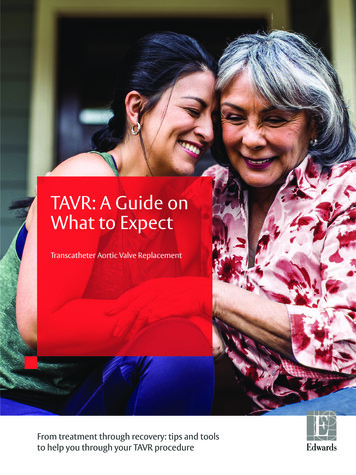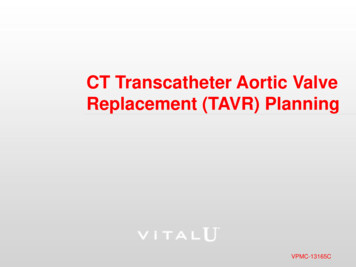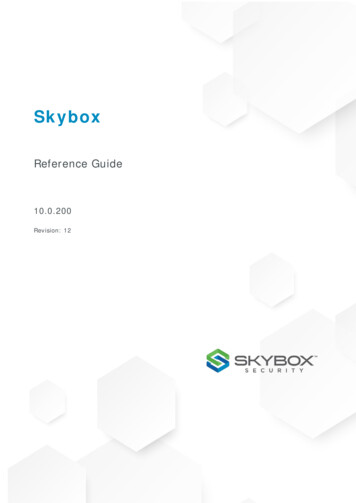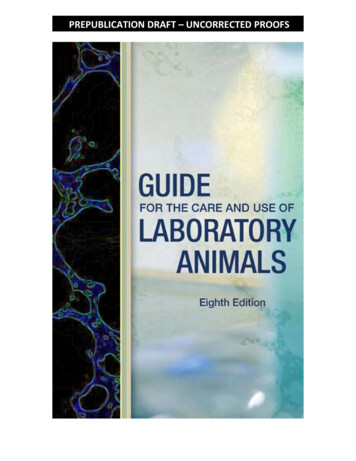
Transcription
TAVR: A Guide onWhat to ExpectTranscatheter Aortic Valve ReplacementFrom treatment through recovery: tips and toolsto help you through your TAVR procedure
The TAVR Procedure: A Guide for Patients andCaregiversThis guide is designed to help patients who have severe aortic stenosis and their caregivers preparefor the transcatheter aortic valve replacement (TAVR) procedure. If you are reading this guide, youor your loved one has been evaluated by a TAVR Heart Team and told you were eligible for TAVR.As with any procedure, you may have questions and concerns. You may wonder how you shouldprepare for TAVR and how it’s performed. You may be unsure of what happens on the day of theprocedure and what questions to ask. You also may want to know what to expect after TAVR andwhen you’ll be able to go home. Talk to a TAVR doctor about any questions you may have.We hope this guide will answer some of the most common questions that patients have aboutthe procedure and recovery.This document features interactive links,denoted by an icon like this.Click on them to access deeper information.Click herefor moreinformationDid you know that more than 400,000 people worldwidehave received the TAVR procedure?Click for more information.How to use this guideThe booklet is divided into4 sections that take youthrough what to expectbefore, during, and afteryour procedure. In eachsection, you’ll also finddiscussion questions to startconversations with yourdoctor and TAVR Heart Team.Preparing for TAVR Page 3Life After TAVR Page 9For Caregivers Page 22Patient Resources Page 25By reading this guide before your procedure, it will help you know what to expect to preparefor your TAVR procedure and life after TAVR. You and your caregiver may want to revisitsections of this guide as you prepare for each step of the procedure and, most important,your recovery.2
How Is TAVR Performed?Compared with open heart surgery, TAVR is a less invasiveprocedure. The most common way for your doctor to getaccess to your heart to replace your valve is through yourupper leg. Your doctor may refer to this as the transfemoralapproach. TAVR can also be performed through your chestor neck. Ask your doctor how he will access your heart. T he TAVR procedure starts with a small incision throughthe artery in your upper leg or groin A small catheter (a hollow tube) with a balloon on theend is pushed through an artery in the leg. The doctoruses a special x-ray machine to guide the catheter to theheart T he balloon is inflated to expand the new valve intoplace, pushing the leaflets (flaps that open and close)of the old valve aside. The new valve attaches to theold diseased valve’s leaflets and is anchored in place.It begins working right awaySedationDuring TAVR, you will begiven medicine to make yousleep or feel very relaxed.There are two types: generalanesthesia and conscioussedation.General anesthesia will makeyou unconscious for theprocedure.Conscious sedation maymake you sleep, but youwon’t be unconscious.Find out from your facilitywhat kind of sedation youmay have and if you will beawake during conscioussedation.On average, the TAVR procedure lasts about 1 hour, versus 4 hourswith open heart surgery.HeartClick hereto view on in the leg4
How Should You Plan for TAVR?Your TAVR Heart Team will likely have specific instructions for you to follow beforeyour TAVR procedure. Talk with your doctor about what you need to do to prepare for it.Here are some things to consider in the weeks and days leadingup to your procedure: Stay physically active. Ask your TAVR doctor about what level of activity is right for you Know what to eat. Eating the right foods can help you before and after your procedure T ake your medicines. In the weeks before your procedure, take all of your medicines asprescribed. Talk with your TAVR doctor about which medicines you should continue totake or stop taking before and on the day of your procedure Drive carefully. If you are having symptoms from your severe aortic stenosis, ask yourTAVR doctor if it safe for you to drive P repare legal documents. It is not anticipated anything will happen to you during theTAVR procedure; however, it is important to be prepared. The hospital may ask if youhave a living will and/or a power of attorney for healthcare P lan ahead for discharge. Have an open discussion with your doctor about the care youwill need after TAVR. Some people can be released from the hospital the day after theprocedure, but everyone is different D iscuss with your doctor the need for a dental evaluation. Any infection that may bepresent in your mouth or teeth can spread and cause an infection in your heart valve.Therefore, it is important for your dentist to examine you and provide dental clearancebefore the TAVR procedure F ind out about insurance coverage and TAVR. The valve clinic coordinator on yourTAVR Heart Team should be available to help you with all TAVR-related insurance andfinancial questions. Contact your insurance provider before your first appointment todetermine whether the evaluation and TAVR procedure are covered and whether areferral is necessary. TAVR is covered by Medicare, which will cover most expenses L earn what’s involved with pre-admission testing. One to 2 days before yourprocedure, you may be asked to return to the clinic to get an update on yourmedications, have your blood pressure and heart rate checked, and undergo a chestx-ray scan and other exams, including blood and urine testsRefer to the Patient Resources section onpage 25 for more information.5Click herefor moreinformation
Packing for Your Hospital StayMost people who have TAVR go to the hospital the morning of the procedure.Sometimes people may be asked to go the hospital the night before. Follow theinstructions from your TAVR Heart Team.Packing checklist:Toothbrush and toothpasteComb or brushSlippers (with nonslip soles)GlassesDenture caseHearing aidsReading materialsPajamasComfortable clothes to go home inIt is recommended that you do not bring cash orvaluables to the hospital.Be sure to see page 26 of this document for a helpfulform to keep track of your appointments before yourprocedure.6
DoctorDiscussionGuidePreparing for TAVRAs you plan for your TAVR procedure, you will likely have a lot of questions for yourTAVR Heart Team. You can refer to this page when you talk with them.Is my TAVR procedure covered by my insurance? How can I learn about mycoverage?What are the benefits and risks of TAVR versus open heart surgery?What health changes do I need to let my doctor know about before myprocedure?How long will my procedure take?Which type of sedation will be used during my procedure?How long will I be in the hospital? Do I need someone to drive me home?Will I be on blood-thinning medication?How soon after the procedure will my symptoms go away?If I go home after discharge, what type of support should I arrange in advance?What hospital-specific instructions do I need to be aware of for my TAVRprocedure?How long will the valve last?Which transcatheter heart valve options are available and which will I receive?7
What to Expect the Day of Your TAVR ProcedureOn the day of your TAVR procedure, you and your caregiver should feelprepared and have a good understanding of what to expect.Click herefor moreinformationEvery hospital has different instructions for patients to follow. The recovery timeand length of hospital stay may be different for each person, too. However, patientswho receive TAVR usually have a shorter hospital stay than those who receive open heartsurgery. Your TAVR doctor can tell you how long you can expect to stay in the hospital afterthe TAVR procedure. The goal is for you to go home as soon as it is safe for you to leave.DoctorDiscussionGuideThe Day of Your ProcedureAsk your doctor any questions you have about the day of your procedure, such as these:What can I eat and drink the day before my procedure? How late can I eat?Are there any special bathing instructions I should follow?Can I take my medicines as I usually do?How much pain should I expect? How long does the pain usually last?How soon after the procedure may I get out of bed and start walking?Will I be evaluated later that day or the following day?Who will follow up with me during my hospital stay?8
Life After TAVRDuring your recovery, there are important steps that you—and your caregiver—can taketo help you recover and return to your daily routine more smoothly. This section will helpyou through many of those steps, and it will address some of the concerns and questionsyou may have about life after TAVR, including the following: What to expect after your TAVR procedure while you’re still at the hospital What to expect after you are discharged and leave the hospital Caring for your health Important things to keep in mind H eart-healthy eating Follow-up after TAVR What to know about imaging scans What to discuss with your doctor9
What Can You Expect After the TAVR Procedure?While you’re still in the hospitalAfter your TAVR procedure, the TAVR Heart Team will update your caregiver or lovedones on how you are doing. Talk with your team about how long your visitors mightexpect to wait before they can see you.You will have some intravenous (IV) lines, tubes, and machines connected to you. Thenumber of tubes, as well as the amount of pain and discomfort you may feel, depends onwhich TAVR approach you have. Every patient is different. Talk with your TAVR Heart Teamabout what to expect.As you recover in the hospital, your nurses and TAVR Heart Team will help you with thefollowing:Pain controlPay attention to your pain, and tell your nurses how you arefeeling. They can give you pain medicine to help keep your painunder control.Sitting upand walkingAfter your procedure, your TAVR Heart Team will help you to situp and encourage you to move. Try to move as often as you areasked to. This will help with your recovery.BreathingYour TAVR Heart Team will give you breathing exercises to doto keep your lungs clear and to help prevent complications.Incision careYour nurses will change and remove your incision dressing asneeded. This can help prevent infection.MedicinesYour TAVR Heart Team may prescribe more medicines for you,including blood thinners. Talk with your team if you have anyquestions about the medicines they prescribe.Using therestroomAsk your nursing team to help you if you need assistance withyour usual bowel and bladder routine.Your newvalveBefore you leave the hospital, your TAVR Heart Team may giveyou an echocardiogram that shows moving images of yourheart to make sure your valve is working correctly.10Click herefor moreinformation
What to expect when you leave the hospitalAs you leave the hospital after TAVR and begin your recovery, there are some importantthings to keep in mind. The following information will help guide you through what youneed to think about during your recovery period. This information is not meant to replacewhat your TAVR doctor tells you. Be sure to follow the instructions your team gives you atdischarge—and contact them at any point during your recovery if you have questions ordo not feel well.Partnering with your caregiverWhen you are ready to be discharged from the hospital, you will need someone to pickyou up and drive you home. You also will need help for at least the first few days after yourprocedure and possibly longer. It is okay to ask for help as you get back to your daily life.Talk with your caregiver about what you need and how he or she can best help you. It maybe useful to review the caregiver section on page 22 of this booklet together.Click hereDiscuss your activity with your doctor. While some people may noticeto see aimprovement in their energy level and quality of life right away, for others itfollow-upschedulecan take days or weeks. As you begin to increase your activities, remember yourbody may need time to adjust to being active again. Give yourself time to rest whenneeded.11
Caring for Your HealthHere are some things to keep in mind as you start your recovery and care for your health.Incision careYou will need to take some simple steps to help the incision site heal andto reduce the risk of infection.Follow the instructions you were given at the hospital. Call your TAVR doctorright away if you notice any signs of infection, such as the following: I ncreased pain, redness, or swelling at the incision site L iquid oozing from the incision site F ever (check your temperature as often as your TAVR doctor tells you to)Managing painYou may have some aches and pains after TAVR, which are part of the normalhealing process. You may have pain in your back, shoulders, neck, and chest.You may leave the hospital with a prescription for pain medicine. If you aresore or uncomfortable, take this medicine as your TAVR doctor told you to.If you do not take your pain medicine, you may not be as active as youcould be. Let your TAVR doctor know right away if your pain medicine is notworking well.Lung careDuring your recovery, continue to perform the breathing and coughingexercises you learned at the hospital. They will help keep your lungs clear andprevent complications. Follow the directions your TAVR Heart Team givesyou about how to keep your lungs healthy, especially if you have chronicobstructive pulmonary disease (COPD).12
Important Information to Keep in MindHere are some additional things to consider to keep you on the right track as you recover.Daily activitiesBe patient and follow the advice of your TAVR Heart Team. You may needhelp when you first go home. It is best to plan ahead so you have thehelp you need.Taking medicines Take all of your medicines exactly as prescribed. Do not stop takingany medicine without first talking with your TAVR doctor Make sure to bring a list of all of your medicines to every healthcareappointmentDental precautionsLet your dentist know that you have had a heart valve replacement. Youwill likely need to take an antibiotic before having any procedure, includinga cleaning. This can reduce the risk for getting an infection in your newheart valve.Click hereTalk with your TAVR doctor if you notice any changein the way you feel or if something does not feel right.13to track yourrecovery
Heart-Healthy EatingHealthy eating is an important part of a healthy life. During recovery, nutritious food givesyour body energy and can help you heal more quickly. Below are some general guidelinesfrom the American Heart Association for heart-healthy eating.Eat balanced meals. Eating a wide variety of foods gives your body all thenutrients it needs to heal. You should have a healthy balance of fruits and vegetables whole grains and breads low-fat dairy products lean meats, including fishMake healthy food choices. Healthy options include foods that are rich infiber and low in saturated and trans fats.Lower your cholesterol. Reduce saturated fat to no more than 5% to 6% ofthe total calories you eat each day. Talk with your TAVR doctor about thefood choices that are best for you.Limit your intake of less healthy food. Foods to limit include those rich insaturated and trans fats, sugar, and salt. When possible, avoid processedmeats.Visit www.heart.org/nutrition for more information about heart-healthyeating, including resources such as the Simple Cooking with Heart guide dining out heart-smart shopping heart-healthy recipes14
Tips for Heart-Healthy EatingYour TAVR Heart Team can suggest an eating plan that’s right for you. Here are some tipsfrom the American Heart Association to get you started.Vegetables and fruits are loaded with nutrients and low in calories.They also contain fiber and water, which help you feel full. Enjoy avariety of fruits and vegetables at every meal and snack. Fresh, frozen,and low-sodium canned may all be healthy choices.Whole grains are generally a good source of dietary fiber. Whole-grainfoods include whole-wheat bread, rye bread, brown rice, popcorn,oatmeal, and whole-grain cereal.Chicken, fish, and beans are good sources of protein. Use lean cuts,and remove skin from poultry. E njoy fish rich in omega-3 fatty acids at least twice a week. Oily fishsuch as salmon, mackerel, trout, and albacore tuna are good choices small handful of nuts or seeds can be a healthful snack. Choose Aunsalted nuts or those with no more than 140 milligrams of sodiumper serving size. You will find this information on the nutrition labelof the package se fresh or dried herbs when cooking. At the table, use salt-free Useasoning blends instead of salt. Add a squeeze of fresh lemon orlime to add flavor to fish and vegetablesAdapted with permission from the American Heart Association, Daily Tips to Help Your Family Eat Better,on www.heart.org.15
Follow-up After TAVRAnother part of your recovery is attending scheduled follow-up visits with your TAVR HeartTeam. During these visits, the TAVR Heart Team will check your progress and ensure thatyour heart is working as it should. In addition, blood tests may be performed to monitor how your medicines are working y ou might have your blood drawn to make sure the amount of blood thinneris steady to prevent blood clotsTo check how you’re healing, the TAVR Heart Team may order some tests, including thefollowing: Echocardiogram to check valve function Electrocardiogram to detect any abnormal heart rhythmsYour TAVR Heart Team will discuss other factors affecting your health. Follow their adviceregarding diet, exercise, and medicines.Your follow-up appointmentsBe sure to go to all of your scheduled appointments. Be an advocate for your ownhealth. Monitor how you are feeling, and keep track of questions you have as yourecover. Share this information with your doctor at your follow-up visits as you partnerwith them for a successful recovery.Click herefor moreinformation16
A Typical Follow-up ScheduleYour TAVR Heart Team will recommend a schedule that’s best for you. Contact your TAVRHeart Team at any time during your recovery if you have questions or concerns.Refer to this check list to know what to expect for your follow-up schedule.Timeframe afterTAVRWhat to expect and doIn the first 24 hours up to the first few days afterdischarge, you may receive a follow-up phone callfrom a member of your TAVR Heart Team who willbe checking in on your symptoms, medicines, andwell-beingIn the first 30 daysafter TAVRYou will likely be scheduled for an in-officefollow-up visit. At this visit, you will likely have anechocardiogram recorded to check your new valve.You may also have other tests and be asked toshare some information about your symptoms andquality of life. Some TAVR teams may recommendthat you see your primary care provider 5 to 7 daysafter dischargeIn the months afterTAVRYour TAVR doctor should transfer your care backto either your general cardiologist or your primarydoctor. Please schedule your visit with your doctorwithin the first week of discharge. Talk with yourTAVR Heart Team to see what they would like youto do about checking your progress with themEvery year after TAVRYou should schedule a follow-up appointment withyour cardiologist specifically to check your heart.At this visit, you will likely have an echocardiogramrecorded and may complete some additional testsBe sure to see page 27 of this document for a helpfultool to keep track of your follow-up visits.17
What to Know About Imaging ScansIs it safe to undergo an x-ray or computed tomography (CT) examafter TAVR?Your valve is completely safe for both x-ray and CT examinations.Will my valve cause a metal detector at the airport to go off?Going through an airport metal detector will not affect your valve. The amount of metalused in valves is very small. It is usually not enough to set off metal detectors. If it does,simply show the security personnel your transcatheter valve identification card.Is it safe to undergo a magnetic resonance imaging (MRI) scanafter TAVR?An MRI scan will not affect your transcatheter heart valve. However, there is importantinformation your doctor needs to know before you undergo an MRI scan. Please referyour doctor or the MRI lab staff to www.edwards.com/mri-safety for more detailedinformation.Be sure to inform all healthcare professionals that youhave a transcatheter replacement valve, and share yourtranscatheter valve ID card with them.18
DoctorDiscussionGuideLife After TAVRIt is important to follow the discharge instructions your TAVR Heart Team gives you whenyou leave the hospital. These are some questions you may want to ask your teambefore you leave:Will I feel better right away or will it take time for my symptoms to go away?Will I have stitches? If so, how long will they stay in?When should I schedule my follow-up visits?How soon will I have to go back to the hospital for a checkup?What will my restrictions be? Will I have to stay on bedrest?What symptoms should I watch out for and call the doctor about?19
DoctorDiscussionGuideLife After TAVRIncision careHow do I keep the incision site clean?How do I protect the incision site to help it heal?Is there specific clothing I can wear to help keep the incision site comfortable?How can I reduce my risk for infection?Managing painWhat kind of pain medicine will I take after my procedure? How often do Itake it?Are there other ways I can manage my pain in addition to my pain medication?20
DoctorDiscussionGuideLife After TAVRLung careHow many times each day should I do my lung exercises?When can I stop doing my lung exercises?Daily activitiesAre there any showering instructions I need to follow?Can I take a bath or go swimming?Are there any activities that I should avoid after my TAVR procedure?How soon can I get back to my day-to-day activities around the house?When and how can I increase my physical activity?When can I return to sexual activity?Can I drive?21
Taking Care of Your Loved OnePreparing for TAVR: tips and support for caregiversThe TAVR Heart Team will provide the person you are caring for with specificinstructions for you to follow before the TAVR procedure. Talk with the TAVRHeart Team about how you can help him or her get ready. Here are some actionsto consider in the weeks and days leading up to the procedure.22
ActionHow You Can HelpMonitoringphysicalactivityBe watchful of the person you’re caring for while he or she isexercising. Instruct him or her to slow down or stop if there is anysign of shortness of breath, chest pain, or feeling faint. Report anyworsening symptoms you notice back to the TAVR Heart Team.Maintaining abalanced dietIt’s important that the person you’re caring for eats a well-balanceddiet and that you offer encouragement. The TAVR Heart Team mayhave put restrictions on how much liquid and salt your loved onecan have.TakingmedicinesIt can be helpful to keep track of all the medicines the person youare caring for takes and when he or she should take them. You canuse a pill organizer or a small notebook to stay organized.DrivingcarefullyTypically, people with severe aortic stenosis are winded and maynot be able to drive. Each person is different. Talk with the TAVRHeart Team about whether the person you are caring for should bedriving.Preparing legaldocumentsConsider helping to ensure the necessary legal paperwork isorganized and completed.Packing for thehospital stayHelp the person you’re caring for pack for the hospital—a pair ofpajamas and a comfortable outfit to go home in is enough. Donot bring valuables. A patient may be moved to another room atleast twice during the hospital stay. It’s possible for things to bemisplaced during these moves. It may be best if you keep his or herclothes until the day of discharge.Planning aheadfor dischargeIf the person you are caring for is discharged home, you can helpwith tasks related to his or her recovery. This includes helping withbathing, medicine reminders, and follow-up visits. You can alsohelp with making meals, cleaning, and running errands. If you thinkadditional help is needed, talk with your social worker or nurseabout local people who may be available to help. Remember,while the patient may leave the hospital feeling better, he or shemust listen to the doctor’s orders and take it easy.Click hereto view video23
DoctorDiscussionGuide ForCaregiversAs a Caregiver: Questions to Ask the DoctorAbout Preparing for TAVRWhat kind of anesthesia will be used? Will it make the patient feel sick?If so, what should I do?How long will the person I’m caring for be in the hospital?Will I need to spend the night in the hospital to make sure he or she is properlycared for?For how long will he or she have symptoms after the procedure, and what mightthey be?How do I need to be prepared to provide care at home? What kind of additionalsupport should I arrange for in advance?Will the person I’m caring for need physical therapy or rehab?Will this procedure affect any of his or her other health conditions?Are there any new medicines that he or she will need to take? What instructionsdo I need to know about them?What legal or other documents should I help my loved one prepare?What is the average length of time for recovery?What kind of quality of life will he or she have after TAVR?What kind of resources are available to help us know how to plan for TAVR?24
TAVR Patient ResourcesIn the next few pages, you’ll find helpful tips and tools to support you before, during, andafter TAVR. V isit www.NewHeartValve.com to learn more about the TAVR procedure. Youwill also find all kinds of useful information, including patient testimonials, videos,brochures, and additional information on TAVR as a treatment option. V isit www.TAVRbyEdwards.com to learn more in-depth information aboutEdwards transcatheter heart valves, the Edwards valve difference, and clinical data. S ign up for Edwards PatientConnect, a support program with dedicated caremanagers who can answer your non-medical questions and support youthroughout your journey. Connect with patients who have been through TAVR andcan share their experience and help you understand what to expect.– V isit www.EdwardsPatientConnect.com or call 1-877-209-8638 to speak witha team member25
Doctor Visits: Before Your TAVR ProcedureHere is a helpful form that you can complete and use to schedule and keep track of yourappointments before your procedure.Visits Before TAVRDateReasonDoctor:Address:Phone:26
Doctor Visits: After Your TAVR ProcedureIt’s important for you to attend your follow-up visits with your TAVR Heart Team after yourrecovery. Remember, your TAVR Heart Team will recommend the schedule that’s best foryou in the days, months, and years after your procedure.Simply complete the form below to keep track of your follow-up visits.Follow-up Visits After TAVRDateReasonDoctor:Address:Phone:27
Your Recovery TrackerPrint andtake to yourDoctorRecovery from TAVR is a gradual process. Monitoring your recovery each weekcan help you track your progress. The trackers below include several important partsof your recovery that you should note. Talk with your TAVR Heart Team about other thingsthey may want you to keep track of. These could include breathing exercises; physicalactivity; or any notes, concerns, or questions you may want to share during your follow-upvisits. Bring these trackers to your visits.How I feel overallCircle one number each week.Not wellOkayVery wellWeek 112345Week 212345Week 312345Week 412345My pain levelWrite down your symptom and circle one face each week to show your pain level.Week 4Week 3Week 2Week 1Doesn’thurtHurts alittle bitHurts alittle moreHurtseven moreHurts awhole lotHurts 28
Things I did this weekNote the activities you were able to do each week. For example: “Went grocery shopping”or “Light housekeeping.”Week 1Week 2Week 3Week 4Medicines I am takingName of medicineTime(s)I take itDose29WithfoodWithoutfood
Click herefor moreinformationFinding SupportAs you recover from TAVR, it is normal to feel a wide range of emotions. It canhelp to share with others your experiences and how you are feeling. Find a friend or lovedone whom you feel comfortable talking with, and share how you are feeling. Visit friendsor go out socially when you feel ready. You might also look for local support groups whereyou can meet and share with people who know what you are going through. They canhelp you to talk about your emotions as you recover. You may find the following resourceshelpful:Alliance for Aging Research: www.agingresearch.orgAmerican Heart Association: www.heart.org/heartvalvesFamily Caregiver Alliance: www.caregiver.orgHeart Valve Financial Aid Fund and CareLine: https://heartvalve.pafcareline.org/Heart Valve Voice: www.heartvalvevoice.orgMended Hearts: www.mendedhearts.orgWomenHeart: www.womenheart.orgWelcome to the TAVR Community!You will receive a transcatheter valve temporary ID card when you leave thehospital. A permanent ID card will be mailed to you at home within 6 to 8 weeksof your procedure.Please call 888-892-0099 if you need a replacement card. You should keep thiscard with you at all times and show it to all your healthcare providers.Included in the letter with your ID card will be an invitation to join the Edwardscommunity to receive helpful information, updates by mail and email, andsupport during your first year after TAVR. It’s up to you if you’d like to participate inand connect with Edwards and the heart patient community during your journeyto heart health.Remember, recovery from TAVR will not happen
Compared with open heart surgery, TAVR is a less invasive procedure. The most common way for your doctor to get access to your heart to replace your valve is through your upper leg. Your doctor may refer to this as the transfemoral approach. TAVR can also be performed through your chest or neck. Ask your doctor how he will access your heart.










